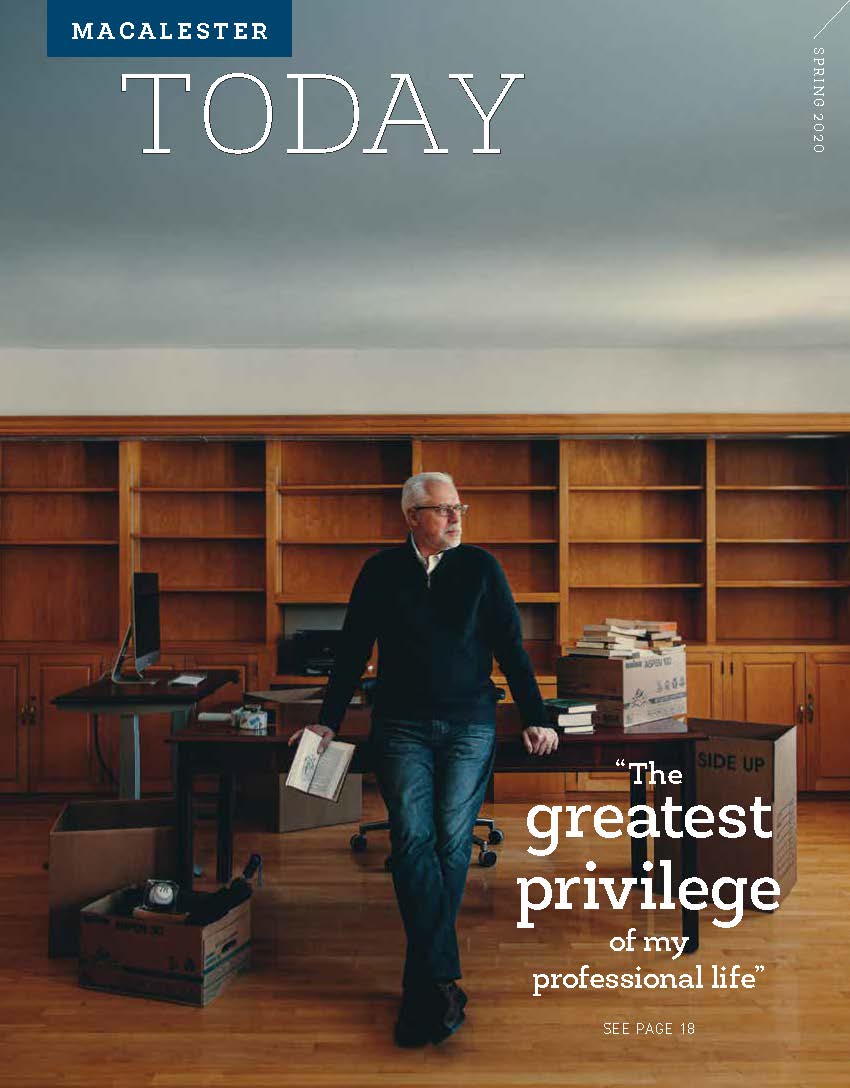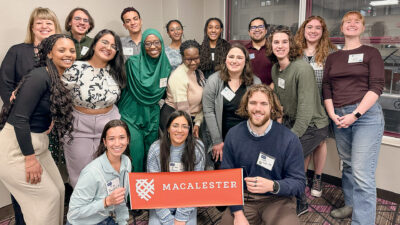
Physician Heidi Baines ’95 has spent much of her career working in frontier (that’s “beyond rural”) Alaska, including four years at the Kodiak Area Native Association (KANA), a health care nonprofit for Alaska Natives. Each month, she flew from Kodiak to Karluk (population: 28) and sometimes to other remote villages as well to provide care. The four-seater plane always carried mail and groceries. One time, Baines flew with a box of turkey and chicken chicks beside her. Weather was always a factor. “There’s a lot of waiting and gambling on the weather,” she says, “or you can get stuck.”
A Russian studies major at Macalester, Baines discovered her path in the Career Development Center (now Career Exploration). Career interest tests indicated a strong affinity for health care, so she volunteered at St. Paul’s Family Tree Clinic, complementing her coursework with reproductive health training. During fall semester of her senior year, she interned at a nonprofit HIV prevention organization in Moscow, and she returned there to work for another year after graduation.
In medical school at the University of Washington–Seattle, Baines did a semester of rotations in Alaska, then completed her residency there and stayed. Her first four years of practice were in Unalaska, 800 miles and a three-hour flight from the nearest hospital. She also spent four years in “less”-remote Kodiak, and last year Baines and her family left Kodiak for Anchorage, where she’s now the lead physician at Vera Whole Health. We talked about her medical bag—the tools she’s found most useful for treating patients in frontier Alaska.
Perspective
People who live in these areas have a sense of their own mortality. If you need hospitalization, it may take hours or even more than a day traveling by boat, plane, or four-wheeler (or all three) to get there. Like most Americans, they still expect that you’re going to fix them, but there’s also an understanding that you have limitations on what you can do, and that humans cannot control the weather.
Continuity
My goal is to establish a relationship with the patient so that over time we can make progress. Primary care often focuses on chronic, unsolvable problems. You have to have a good perspective for that or else you’re going to get really tired. Maybe the win is that really grumpy elderly patient who came in rarely, and mostly with complaints about her care, who now comes every month and tells you about going berry-picking. And you’re that link. If something does happen, she’s going to talk to you about it.
Context
There are a lot of reasons why people come to the health care system in the way that they do. Helping people not feel abandoned has been an issue I’ve encountered. With our native population, what have they experienced? They have experienced new health care providers every couple years for their whole life. They’ve experienced a lot of someone else’s culture being imposed upon them. They’ve experienced a loss of culture, infrastructure, and tribal knowledge over generations that still impacts them today. I think about how I can create a relationship and a space with this person so that they feel taken care of, understood, and respected for the time I have with them.
Somebody’s Someone
At KANA, we started a medication-assisted treatment program for people who experience opiate use disorder. Remembering that everybody is somebody’s someone is really important. So is maintaining your compassion while being realistic and recognizing that change is up to the patient, and remembering the incredible barriers to getting well. Addiction is a chronic disease and there are real brain changes that happen. Judging people isn’t helpful. It doesn’t make anything in life go away.
Power Cord
When I was traveling to the villages, I always took with me a plastic tote that contained a flannel sheet, a towel, toiletries, The Time Traveler’s Wife because I can read it multiple times, and a change of clothes. I also had medical supplies, in case the clinic wasn’t well-stocked, and nonperishable canned food. I used all those things at one time or another. I got stranded in Karluk for three days twice, and I slept on the floor of the two-classroom schoolhouse. I did forget my power cord, but luckily someone let me borrow theirs so I could charge my phone. There was no wifi or cell service at the time, but I appreciated the music and my podcasts.
By Julie Hessler ’85
April 22 2020
Back to top





